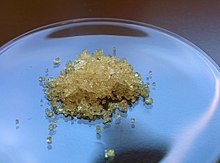Potassium hexacyanochromate(III)
Appearance

| |

| |
| Names | |
|---|---|
| IUPAC name
Potassium hexacyanochromate(III)
| |
| Identifiers | |
3D model (JSmol)
|
|
| ChemSpider | |
| ECHA InfoCard | 100.033.694 |
| EC Number |
|
| MeSH | Hexacyanochromate |
PubChem CID
|
|
CompTox Dashboard (EPA)
|
|
| |
| |
| Properties | |
| C6CrK3N6 | |
| Molar mass | 325.399 g·mol−1 |
| Appearance | Vivid, yellow, opaque crystals |
| Density | 1.71 g/cm3 |
| 30.96 g/l00 mL (20 °C) | |
Except where otherwise noted, data are given for materials in their standard state (at 25 °C [77 °F], 100 kPa).
| |
Potassium hexacyanochromate(III) is an inorganic compound with the formula K3[Cr(CN)6]. It consists of three potassium cations and [Cr(CN)6]3− anion. It is a yellow, air-stable, paramagnetic solid. It is isomorphous with potassium ferricyanide.
Synthesis and reactions
The salt is prepared by treating chromium(III) salts with KCN.[1][2][3]
Reduction of hexacyanochromate(III) gives the Cr(II) and Cr(0) derivatives, [Cr(CN)6]4- and [Cr(CN)6]6-, respectively.[4]
References
- ^ F. Hein; S. Herzog. "Potassium Hexacyanochromate (III)". In G. Brauer (ed.). Handbook of Preparative Inorganic Chemistry. Vol. 2 (2 ed.). p. 1373.
- ^ Cruser, Frederick Van Dyke; Miller, Edmund H. (1906). "The insoluble Chromicyanides". J. Am. Chem. Soc. 28 (9): 1132–51. doi:10.1021/ja01975a003.
- ^ Marvaud, Valérie; Mallah, Talal; Verdaguer, Michel (2004). Potassium Hexacyanochromate(III) and Its 13C-Enriched Analog. Inorganic Syntheses. Vol. 34. p. 144. doi:10.1002/0471653683.ch4.
- ^ Eaton, Janice P.; Nicholls, David (1981). "The Complex Cyanides of Chromium(II) and Chromium(0)". Transition Metal Chemistry. 6 (4): 203–206. doi:10.1007/BF00618223. S2CID 96193332.
